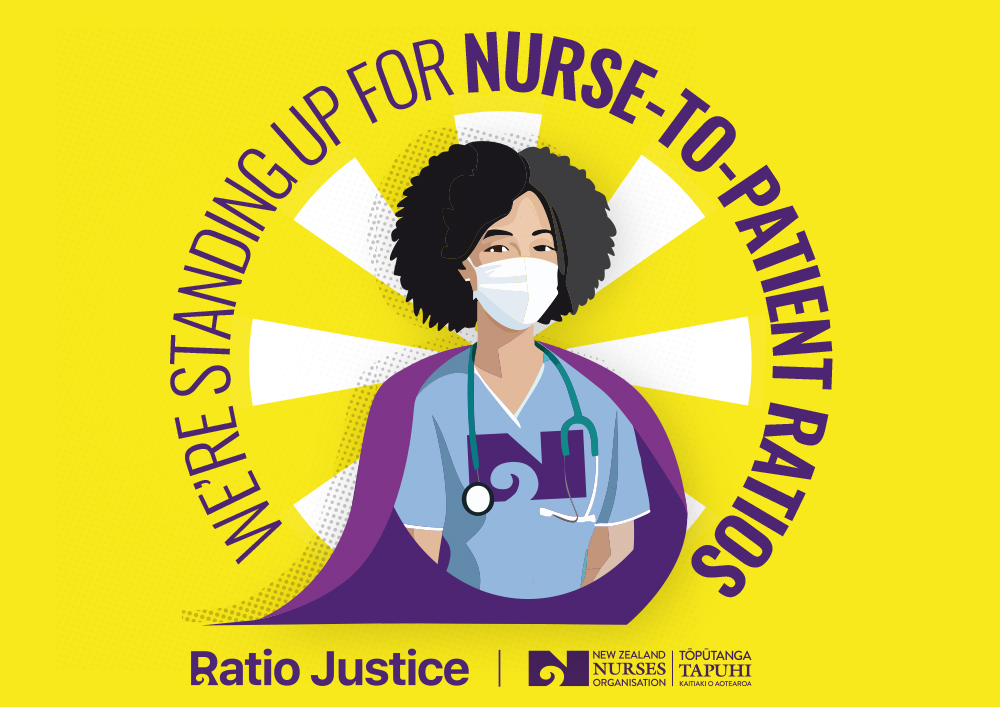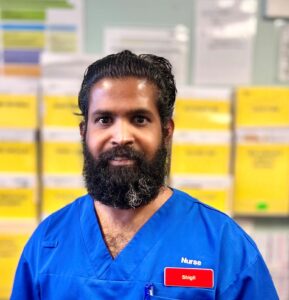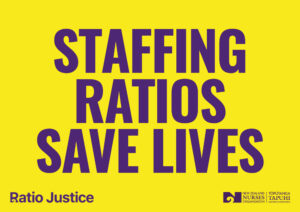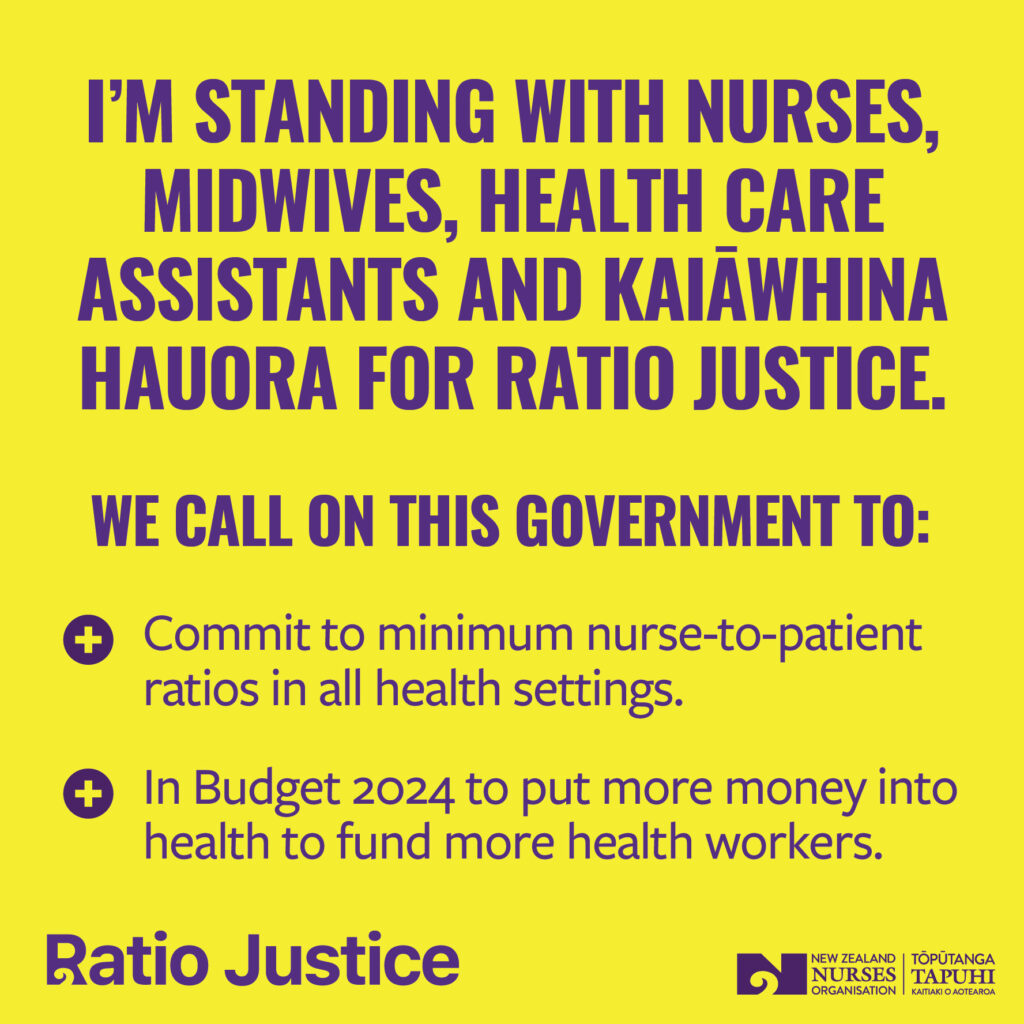
“Heart-breaking”, “disappointing” and “awful” is how nurses and kaiāwhina describe their current staffing levels across several sectors.

“It’s quite heart-breaking actually and it’s really disappointing,” NZNO delegate and Auckland paediatric nurse Jade Power told Kaitiaki. “All of us, as nurses and health-care workers and midwives, want to provide the best care that we can.”
‘Caregivers are working back-to-back shifts many days a week. They might be doing 16 hours a day, five days a week — seriously, it is awful.’
Power and colleagues are among those attending 20 rallies around the country Thursday calling for more health funding in the 2024 Budget, due on May 30.
In the current climate, nurses are often forced to ration their care, said Power.
“If a patient deteriorates, our whole focus is on them and we just have to hope our other three to four patients are okay.”

Te Whatu Ora documents, provided to NZNO, show more than a quarter of nursing shifts were below safe staffing targets in 2023 — and some wards had unsafe staffing levels almost constantly.
Power — a recent graduate — said many wards had few senior and experienced nurses which made it “really scary” at times.
“It’s actually really scary. Nurses can’t always see all their patients as much as they need to and at times can’t provide appropriate care and the specialist care they need to provide. We are finding it really deflating.”
‘What happens then is the aged population we’re caring for miss out on things like showers.’
Aged care workforce ‘burning out’
Wellington gerontology nurse and delegate Anita Cook said aged care staff were enduring “awful” pressure leading to burnout, particularly among health-care assistants (HCAs), who were the dominant workforce.

“We see burnout because the caregivers are working back-to-back shifts many days a week. They might be doing 16 hours a day, five days a week — seriously, it is awful,” Cook told Kaitiaki.
And there often were no incentives like penal rates for the overtime: “Except for the fact their wages are so low and the cost of living so high, they have their backs to a wall and don’t really have an option except to do those hours, if they want to survive,” she said.
“By keeping them poor, they are driving this burnout.”
Burnout led to lengthy sick leave, which left many care homes even more short-staffed, Cook said.
Students warned off nursing over burnout

The Government must prioritise investing in both the present and future nursing workforce. Following Australia’s lead, we urge the implementation of a “pay as you earn” system for nursing tauira (students), coupled with essential cost-of-living support.
Enough with the empty promises on safe staffing – action is needed now. As a health-care assistant (HCA) and student nurse, I’ve witnessed first hand the dire consequences of understaffing on patient safety and outcomes. The alarming rate of burnout among nurses and HCAs directly correlates with this crisis.
How can we expect our current workforce, already stretched thin and undervalued, to effectively mentor and teach future nurses during placements? I’ve even had a nurse tell me to reconsider my career choice because of the lack of appreciation and the burnout.
In this context, achieving true equity demands tailored solutions. The current system fails to address the unique needs of Māori and Pacific communities, resulting in stark health disparities. Racism and discrimination persist within our health system, underscoring the urgent need for culturally responsive care provided by Māori nurses.
It’s time for decisive action. The health and well-being of our communities depend on it. It’s time to focus on recruiting, retaining, and empowering the future of our nursing workforce.
— By Shannyn Bristowe (Ngāti Porou, Ngāpuhi)
National student represententative Te Whare Wananga o Awanuiarangi
Co-chair NZNO national student unit
“What happens then is the aged population we’re caring for miss out on things like showers. We’ve had people forgetting to hand out the meals to residents. We had one yesterday who missed breakfast, morning tea and afternoon tea and ended up having hypoglycaemia.”
Nurses in aged care were also feeling the pressure, with at times just one caring for up to 100 residents when short-staffed. “Short-staffing is a really big problem for us.”
It was hard to recruit and retain staff to aged care, which paid less than Te Whatu Ora and did not offer many benefits like penal rates and double time for public holidays.
‘Sometimes staff get assaulted, and we listen to abusive words constantly which is not nice.’
Now the pay equity taskforce had been disestablished by the Coalition Government — despite a promise to pay all nurses equally — she said.
“It just seems really discouraging. Nobody knows what’s going to happen but definitely pay parity is a big issue for the caregivers and nurses.”
Cook said she loved her job and “adores” her residents, but was unsure if she would stay in the long term unless there was change.
“I’ve thought about moving to Australia. I will give it another two years here and if things are not improving I’ll think I’ll just do ‘fly in, fly out’ [contracts] in Aussie.”
‘Dangerous’ understaffing
Palmerston North Hospital mental health nurse and delegate Shigil Gopalakrishnan said with further health cuts signalled, more and more nurses were leaving, mainly for Australia.
‘When you work in a short-staffed area for long, you get burned out and don’t want to work in that place anymore.’
This was leaving wards like his dangerously understaffed, endangering both tangata whaiora [patients] and staff, he said.
“If you don’t have enough staffing to cater to the patients’ needs, they get overactive, physically and verbally, and that impacts on staff. Sometimes staff get assaulted, and we listen to abusive words constantly which is not nice.”

Gopalakrishnan said while wards were understaffed, nurses could only focus on “basic” care.
“Sometimes sitting with them and talking to them might be more helpful than medication. When we are short-staffed we don’t have enough time to do that.”
 Nurses were heading to Australia not just for pay — which was not dissimilar for those in Te Whatu Ora — but better conditions.
Nurses were heading to Australia not just for pay — which was not dissimilar for those in Te Whatu Ora — but better conditions.
“When you work in a short-staffed area for long, you get burned out and don’t want to work in that place anymore.”
Clarity on nurse-to-patient ratios would help, but needed to be alongside the safe staffing system care capacity demand management (CCDM), he said.
Ratios ‘save lives’
NZNO kaiwhakahaere Kerri Nuku said the rallies were intended to highlight “alarming” rates of unsafe staffing in the nursing workforce — including culturally unsafe care and inadequate skill mix.
‘I’ve even had a nurse tell me to reconsider my career choice because of the lack of appreciation and the burnout.’
After legally-enforceable nurse-to-patient ratios were introduced in parts of Australia 10 years ago, there had been fewer readmissions and shorter hospital stays — saving lives and money.
Investment in a clinically and culturally safe workforce would help keep more nurses in New Zealand and address health disparities, she said.
See here for rally locations/times, or below:
| North | |
| Whangārei Hospital | 1.30-4pm |
| Kawakawa at the Paihia/Whangārei roundabout | 1 – 2.30pm |
| Auckland City Hospital (Park Road) | 2-4pm |
| North Shore Hospital | 2-4pm |
| Waitakere Hospital | 1.30-4pm |
| Middlemore Hospital | 2-4pm |
| Elmwood Village, Manurewa | 2-4pm |
| On the corner of Ranfurly and Manukau roads, Epsom | 2.30-3.30pm |
| Hamilton: On the corner of Ohaupo Road and Lorne Street | 1-2pm. |
| Tauranga Hospital (Cameron Road) | 1-2pm |
| Middle | |
| Hawke’s Bay: Stortford Lodge corner in Hastings | 1-2.30pm |
| New Plymouth: Taranaki Base Hospital (south side) Tukapo Street | 2-4pm |
| Whanganui Hospital main gate | 11.30am-1pm |
| Masterton: Wairarapa Hospital | 11.30am-1pm |
| Porirua: Hartham Place North at Cobham Court | 11.30-1pm |
| Wellington Hospital | 11.30-1pm |
| Nelson: Sundial Square, Richmond | 2.30-4.30pm |
| South | |
| Christchurch Hospital (by the boatsheds bridge) | 12.30-1.45pm |
| Christchurch: Outside BUPA Parklands, Papanui Rd | 2.30-3.30pm |
| Dunedin Hospital main entrance | 2-4pm |
| Dunedin: Meridian Mall | 9am-6pm |
| Invercargill: Elles Road by Kew Hospital | 9-11am |
| Invercargill: Elles Road & Tay Street intersection by Mitre10 | 2.30-4.30pm |

- A photo caption in this article suggesting all Anita Cook’s colleagues would be attending the day of action was corrected on July 7, 2024, as this was not the case.



